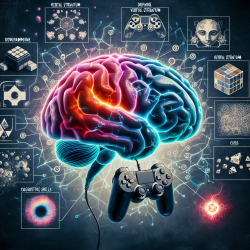Video gaming is a prevalent activity among individuals of all ages, and its impact on neural development has become a topic of significant interest. Recent research, including the study "The neural basis of video gaming," provides valuable insights into how frequent video game playing can influence brain structure and function. This blog aims to help practitioners understand these findings and consider their implications for enhancing cognitive skills through targeted interventions.
Understanding the Neural Correlates of Video Gaming
The study conducted by Kühn et al. (2011) investigates the structural and functional brain changes associated with frequent video game playing. Using voxel-based morphometry and functional magnetic resonance imaging (fMRI), the researchers examined the brains of 154 adolescents, focusing on the ventral striatum—a region linked to the brain's reward system.
The findings revealed that frequent video gamers exhibited higher gray matter volume in the left ventral striatum compared to infrequent gamers. This increase in volume was associated with enhanced activity during feedback of loss in reward-related tasks, suggesting altered reward processing and adaptive neural plasticity.
Implications for Practitioners
These findings offer several implications for practitioners working with individuals engaged in video gaming:
- Cognitive Skill Enhancement: The increased gray matter volume in the ventral striatum may indicate improved cognitive skills such as decision-making speed and accuracy. Practitioners can leverage this information to design interventions that utilize video games to enhance these skills.
- Reward Processing: Understanding how video games affect reward processing can help practitioners develop strategies to manage behaviors related to addiction or excessive gaming. By focusing on reward-based interventions, practitioners can guide individuals towards healthier gaming habits.
- Neuroplasticity: The study highlights the potential for video games to induce adaptive changes in brain structure. Practitioners can explore ways to harness this neuroplasticity for therapeutic purposes, such as rehabilitation or cognitive training programs.
Encouraging Further Research
While this study provides valuable insights, it also opens avenues for further research. Practitioners are encouraged to explore additional studies that investigate the long-term effects of video gaming on brain development and cognitive functions. Collaborating with researchers in neuroscience can lead to a deeper understanding of how video games can be used as tools for cognitive enhancement.
To read the original research paper, please follow this link: The neural basis of video gaming.










